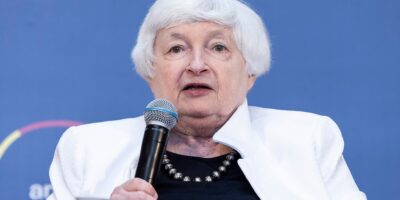Kvetching

A few weeks ago I celebrated my 65th birthday, and although I’ve now reached formal retirement age, I have no intention of retiring any time soon. I love my academic lifestyle. Because teaching, research, and writing are not exactly grueling or dangerous — and because my health remains excellent — I hope to continue doing what I do for another 20 or more years. Yet I do insist on indulging myself now in at least one privilege that accompanies eligibility for senior-citizen discounts: kvetching. So here I go.
My blood boils when I hear President Joe Biden bragging about how many student-loans his administration has ‘forgiven.’ To my ears, his boasts about this ‘accomplishment’ have the same ring as would those of a gang leader expressing pride in stealing large sums of money and then distributing the booty to his cronies. Why doesn’t Biden instead apologize for his raid on the funds of taxpayers, many of whom never attended college, or who either fully repaid their student loans or paid their tuition without borrowed funds? Why isn’t he embarrassed for allowing adults (which the borrowers are and were) to break the contractual obligations that they voluntarily undertook? Where is the President’s worry that his action sets a harmful precedent that will only increase the recklessness of future borrowing?
And why do so many Americans, upon hearing Biden’s bragging, applaud rather than retch?
Here’s another thing that really gets my goat: assertions by many protectionists that over the past few decades, ‘global elites’ have imposed free trade on ordinary people. Imposed?!
Free trade is simply a policy of allowing each individual to spend or invest his money in whatever peaceful ways he chooses regardless of the nationality or residence of any of his trading partners. With a policy of free trade, no one is prevented from dealing with any person, nor is any person forced to deal with any other person or persons. To claim that a government that eliminates tariffs ‘imposes’ on its citizens the freedom to trade makes no more sense than claiming that a kidnapper who releases his hostages ‘imposes’ on these hostages the freedom to return home.
Pundits and politicians who describe free trade as an imposition are either hopelessly ignorant of the meaning of free trade, or they are intentionally portraying it in a false light in order to scare people.
My annoyance is also roused whenever I encounter Americans who are near my age or older – that is, Americans who should remember the 1970s – assert that ordinary Americans today are economically no better off than were ordinary Americans decades ago. This assertion is bunk.
My father was a blue-collar laborer in a shipyard, and my mother a typist and then a clerk in a hardware store. Born in 1958 in New Orleans, I was raised in a solidly working-class American family. I’m here to tell all you young people (and also all you old people whose memories apparently are defective) that working-class Americans today are far wealthier than were their counterparts in the decade of disco. Back then, working-class Americans drove automobiles that broke down much more frequently than do automobiles today. And many goods and services that we today take for granted – goods such as automatic dishwashers, smartphones, laptop computers, air travel, antidepressants, Google, streaming music, e-books, on-line retailing, overnight delivery, and milk from almonds and other non-mammalian sources – were either too expensive for ordinary Americans to consume or simply unavailable (even to the rich) at any price.
I guarantee this: Any of the many people who today bang out, on their MacBook Airs or tablets, everything from tweets to tomes that decry the alleged half-century-long economic stagnation of ordinary Americans would soon, if these persons were suddenly transported back to 1970s middle America, recall life in 2023 as being near Nirvana.
I can forgive today’s young people for believing that their living standards are no better than were those of their parents or grandparents. After all, this claim is broadcast constantly as if it’s a truth as solidly confirmed as the law of gravity. But I cannot forgive people of my or of older generations – people such as Paul Krugman and Robert Reich – for peddling this myth, and for straining to concoct economically laughable reasons to salvage it.
Moving on.
Nothing is more likely to cause me to spit out my morning coffee than coming upon an argument made by economists that minimum-wage legislation has no negative impacts on low-skilled workers. Non-economists can be forgiven for thinking that legislatively imposed minimum wages do nothing more than transfer income from employers to low-skilled workers, with no further consequences on these workers. But no economist should believe this fairy tale, much less trumpet it.
Alas, many people today boasting advanced degrees in economics do assert that minimum-wage legislation can be, and often is, a costless boon for low-skilled workers . Knowing some economics, these pro-minimum-wage economists seldom offer as justifications for minimum wages those narratives that are popular with the man-in-the-street. For example, most pro-minimum-wage economists know enough to reject the man-in-the-street conclusion that’s rooted in the assertion that employers will simply pass along to consumers the higher costs of labor by raising prices of the outputs they sell. Even mediocre economists understand that higher prices for consumer goods and services mean reduced consumer purchases — which, in turn, means lower demand for workers.
Instead, pro-minimum-wage economists know that the one theoretical condition under which an ‘appropriately’ set minimum wage might not cause harm to low-skilled workers is that employers possess monopsony power in the labor market. If a firm is the sole actual or potential employer of a particular kind of labor, that firm maximizes its profits by underpaying its workers. A very pretty graph can be drawn showing that a minimum wage, set just so by a wise and well-informed government, can raise these workers’ wages without causing the unemployment that sensible economists usually predict will be among the negative consequences of a minimum wage.
But this very pretty graph is a textbook curiosity; the graph’s geometric clarity is insufficient to prove that minimum wages do not negatively affect low-skilled workers in reality. First of all, it’s ludicrous to suppose that many, or even any, employers of low-skilled workers in America each has monopsony power over its low-skilled employees. Do clerks at McDonald’s really have no other employment options — say, at Burger King or Walmart or Roscoe’s Lawn Care Co.? For this reason alone the graph has no relevance in reality, or at least not in modern American reality.
Second, it’s also ludicrous to fail to realize that the very pretty graph is drawn under the unrealistic assumption that the only option open to monopsonistic employers when a minimum wage is imposed is to raise workers’ hourly wages. In reality, all employers — including the mythical monsters possessing monopsony power — can adjust to higher wages in many different ways. Employers can, for example, reduce the value of fringe benefits or increase the demands they put on workers while on the job. Ironically, employers with monopsony power over workers would, among all employers, be the most able and eager to adjust to a minimum wage by reducing workers’ non-wage employment amenities.
The fact that pro-minimum-wage economists stubbornly ignore these realities infuriates this now-retirement-age economist!
I could kvetch practically without end. But given that I am in fact not going to retire, I must now stop allowing myself the privilege of acting like the old geezer that, alas, I really have become.










